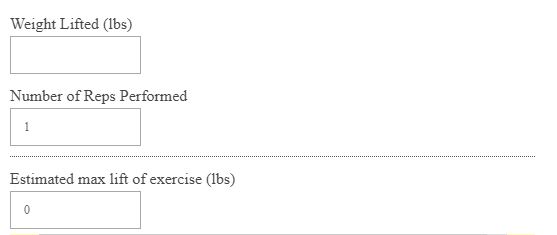Calculate your maximum bench press weight based on a previous lift with a number of repetitions. You can even enter your body weight and push-ups to calculate an estimated maximum bench press.
- Aerobic Capacity Calculator
- BMR Calculator
- Calorie Calculator
- Ideal Weight Calculator
- Push Up Weight Calculator
- Bench Press Pyramid Calculator
Max Bench Press Calculator
Bench Press is one of the big 3 lifts in weightlifting. The other two being squat and the deadlift. These are the 3 lifts performed at most powerlifting competitions that display an individual’s overall strength.
Bench Press also happens to be the most popular lift out of those three. It even has its own powerlifting competitions where it’s the only lift performed. Not to mention the general population has an interest in it because it’s the first lift you learn when you are starting out weight lifting.
So how is your max bench press calculated? The calculator above uses a simple formula that equates the number of reps you performed at a certain weight with a percentage of your max lift.
For instance, if you can lift 150 lbs for 3 reps, your estimated maximum lift is going to be
Bench Press Chart
1 rep – 100% max
2 reps – 95% max
3 reps – 93% max
4 reps – 90% max
5 reps – 87% max
6 reps – 85% max
7 reps – 83% max
8 reps – 80% max
9 reps – 77% max
10 reps – 75% max
11 reps – 73% max
12 reps – 70% max
Proper Bench Press Technique
How to Bench Press Successfully The bench press is one of the most popular exercises in the gym. People see it in every commercial and every movie. It’s used as a competition lift in powerlifting. Everyone wants to be able to bench press more weight than other people. But how can you be certain that you’re doing it right?
The Right Way to Bench Press
1. Lie on a flat bench with your feet flat on the floor. Keep your head centered over your spine, and look straight ahead.
2. Hold the bar at arm’s length next to your chest. Grasp the bar evenly with both hands about shoulder-width apart, without locking your elbows or bending your wrists.
3. Exhale and push the bar off of the rack by extending your arms until they are straight above you. The bar should touch your chest at nipple level when you’re pushing it up. Keep your elbows in front of you; don’t flare them out to the side or behind you.
4. Inhale as you lower the bar slowly to the start position again by bending your elbows until it gently touches your chest (not so far that it hurts).* Repeat for the desired number of repetitions.
5. Don’t lock out your elbows when you’re pushing up or lowering down because doing so could cause elbow injury.
The Benefits of Bench Pressing
The bench press is the most basic exercise you can do in the gym. It is a full body movement that targets chest, triceps, and shoulders. If you are looking for a good upper body workout that targets multiple muscle groups at once, the bench press may be for you.
The bench press is also known as the lower chest press. This is due to the fact that it is actually working your chest, shoulders, and triceps. The only part of the body not being worked is your legs. For this reason, the bench press can be a great substitute for the squat if you are not able to perform squats due to injury or other factors.
The bench press is great because it allows you to perform multiple reps with low weight as well as fewer reps with higher weight. This means that you can start small and work your way up when starting out. It also means that heavyweight can be used when one is more experienced in order to increase overall strength. The biggest benefit of the bench press is its ability to increase strength throughout the upper body by using a variety of different techniques and weights.*
Bench Press Benefits:
- Builds upper body strength
- Helps develop core strength
- Improves posture
Weight Ranges for the Bench
If you are going to be doing any type of weight lifting, it is important that you know your weight range. The weight ranges are not set in stone and will vary from person to person. You need to know how much you can lift at 50%, 75% and 100%. This is important because you should never try to lift more than 100%. You will end up with an injury. Example: If your bench press is 225 lbs, you should never try to lift more than that. You could get hurt because you could possibly tear something in your shoulder or back, etc.
To learn more about your weight ranges, you can check out our max lift calculator here.
